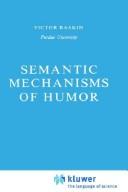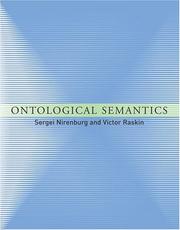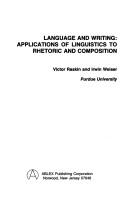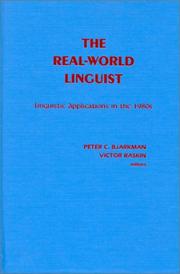| Listing 1 - 10 of 21 | << page >> |
Sort by
|

ISBN: 9027718210 9027718911 9400964749 9400964722 Year: 1985 Volume: v. 24 Publisher: Dordrecht Reidel
Abstract | Keywords | Export | Availability | Bookmark
 Loading...
Loading...Choose an application
- Reference Manager
- EndNote
- RefWorks (Direct export to RefWorks)
Lexicology. Semantics --- Wit and humor --- Semantics --- Humour --- Sémantique --- History and criticism --- Histoire et critique --- -801.56 --- Bons mots --- Facetiae --- Humor --- Jests --- Jokes --- Ludicrous, The --- Ridiculous, The --- Wit and humor, Primitive --- Literature --- Joking --- Laughter --- Formal semantics --- Semasiology --- Semiology (Semantics) --- Comparative linguistics --- Information theory --- Language and languages --- Lexicology --- Meaning (Psychology) --- Syntaxis. Semantiek --- Semantics. --- History and criticism. --- 801.56 Syntaxis. Semantiek --- Sémantique --- 801.56 --- Humour. Sémantique. --- Humor. Semantiek.

ISBN: 0262140861 Year: 2004 Publisher: Cambridge, Mass. MIT
Abstract | Keywords | Export | Availability | Bookmark
 Loading...
Loading...Choose an application
- Reference Manager
- EndNote
- RefWorks (Direct export to RefWorks)
Lexicology. Semantics --- Discourse analysis --- Linguistics --- Ontology. --- Semantics (Philosophy) --- Semantics --- Data processing. --- Philosophy. --- Semantics (Philosophy). --- Ontology --- Intension (Philosophy) --- Logical semantics --- Semantics (Logic) --- Semeiotics --- Significs --- Syntactics --- Unified science --- Language and languages --- Logic, Symbolic and mathematical --- Logical positivism --- Meaning (Psychology) --- Philosophy, Modern --- Semiotics --- Signs and symbols --- Symbolism --- Analysis (Philosophy) --- Definition (Philosophy) --- Being --- Philosophy --- Metaphysics --- Necessity (Philosophy) --- Substance (Philosophy) --- Data processing
Book
ISBN: 9783110186161 9783110186857 3110186853 Year: 2008 Volume: 8 Publisher: Berlin Mouton De Gruyter
Abstract | Keywords | Export | Availability | Bookmark
 Loading...
Loading...Choose an application
- Reference Manager
- EndNote
- RefWorks (Direct export to RefWorks)
Philosophical anthropology --- Thematology --- Ethnology. Cultural anthropology --- Pragmatics --- Wit and humor --- History and criticism --- Wit and humor - History and criticism
Book
ISBN: 1283396564 9786613396563 3110198495 9783110198492 9781283396561 9783110186161 3110186160 9783110186857 3110186853 6613396567 3110186853 9783110186857 9783111736495 Year: 2008 Publisher: Berlin New York Mouton de Gruyter
Abstract | Keywords | Export | Availability | Bookmark
 Loading...
Loading...Choose an application
- Reference Manager
- EndNote
- RefWorks (Direct export to RefWorks)
The book is intended to provide a definitive view of the field of humor research for both beginning and established scholars in a variety of fields who are developing an interest in humor and need to familiarize themselves with the available body of knowledge. Each chapter of the book is devoted to an important aspect of humor research or to a disciplinary approach to the field, and each is written by the leading expert or emerging scholar in that area. There are two primary motivations for the book. The positive one is to collect and summarize the impressive body of knowledge accumulated in humor research in and around Humor: The International Journal of Humor Research. The negative motivation is to prevent the embarrassment to and from the "first-timers," often established experts in their own field, who venture into humor research without any notion that there already exists a body of knowledge they need to acquire before publishing anything on the subject-unless they are in the business of reinventing the wheel and have serious doubts about its being round! The organization of the book reflects the main groups of scholars participating in the increasingly popular and high-powered humor research movement throughout the world, an 800 to 1,000-strong contingent, and growing. The chapters are organized along the same lines: History, Research Issues, Main Directions, Current Situation, Possible Future, Bibliography-and use the authors' definitive credentials not to promote an individual view, but rather to give the reader a good comprehensive and condensed view of the area.
Wit and humor --- Literature --- Appraisal of books --- Books --- Evaluation of literature --- Criticism --- Literary style --- History and criticism. --- Appraisal --- Evaluation --- Wit and humor - History and criticism --- Humor.
Book
Year: 1850 Publisher: Liége : Imp. de Gust. Thiriart, quai de la Batte, 6,
Abstract | Keywords | Export | Availability | Bookmark
 Loading...
Loading...Choose an application
- Reference Manager
- EndNote
- RefWorks (Direct export to RefWorks)

ISBN: 0893914053 Year: 1987 Publisher: Norwood, N.J. Ablex
Abstract | Keywords | Export | Availability | Bookmark
 Loading...
Loading...Choose an application
- Reference Manager
- EndNote
- RefWorks (Direct export to RefWorks)
Literary rhetorics --- Stilistics --- English language --- -Linguistics --- -Report writing --- -Research paper writing --- Research report writing --- Term paper writing --- Authorship --- Germanic languages --- Linguistic science --- Science of language --- Language and languages --- Rhetoric --- -Study and teaching --- Composition and exercises --- Study and teaching --- -Rhetoric --- -Linguistic science --- Research paper writing --- Linguistics --- Report writing --- Rhetoric&delete& --- Exercises
Book
ISBN: 9781501511707 9781501517433 Year: 2020 Publisher: Berlin De Gruyter Mouton
Abstract | Keywords | Export | Availability | Bookmark
 Loading...
Loading...Choose an application
- Reference Manager
- EndNote
- RefWorks (Direct export to RefWorks)
The book contains essays in honor of Victor Raskin. The contributions are all directly related to some of the major areas of work in which Raskin's scholarship has spanned for decades. The obvious connecting idea is the encyclopedic script-based foundation of lexical meaning, which informs his pioneering work in semantics in the 1970s and 1980s. The first part of the book collects articles directly concerned with script-based semantics, which examine both the theoretical and methodological premises of the idea and its applications. Script-based semantics is the foundation of both Raskin's ground-breaking work in humor research (addressed by the articles in part 2) and in Ontological semantics (addressed in part 3), the most recent development of script-based semantics. The fourth part is dedicated to a less-known, but equally important, strand of Raskin's research, the applications of linguistics to other fields, including writing, lexicography, and professional applications (e,g., tourism). Overall, the book provides and up-to-date, in-depth discussion of an influential strand of the discussion on semantics and its most recent developments and influence on other seemingly unrelated fields, such as Cognitive Linguistics.
Festschrift - Libri Amicorum --- E-books --- Lexicology. Semantics

Abstract | Keywords | Export | Availability | Bookmark
 Loading...
Loading...Choose an application
- Reference Manager
- EndNote
- RefWorks (Direct export to RefWorks)
800 --- Applied linguistics --- Linguistics --- Taalwetenschap. Taalkunde. Linguistiek --- 800 Taalwetenschap. Taalkunde. Linguistiek
Periodical
ISSN: 18614116 Year: 2010 Publisher: Boston ; Berlin De Gruyter Mouton
Abstract | Keywords | Export | Availability | Bookmark
 Loading...
Loading...Choose an application
- Reference Manager
- EndNote
- RefWorks (Direct export to RefWorks)
Book
Year: 1883 Publisher: Liège : imprimerie brevetée Gustave Thiriart,
Abstract | Keywords | Export | Availability | Bookmark
 Loading...
Loading...Choose an application
- Reference Manager
- EndNote
- RefWorks (Direct export to RefWorks)
| Listing 1 - 10 of 21 | << page >> |
Sort by
|

 Search
Search Feedback
Feedback About UniCat
About UniCat  Help
Help News
News